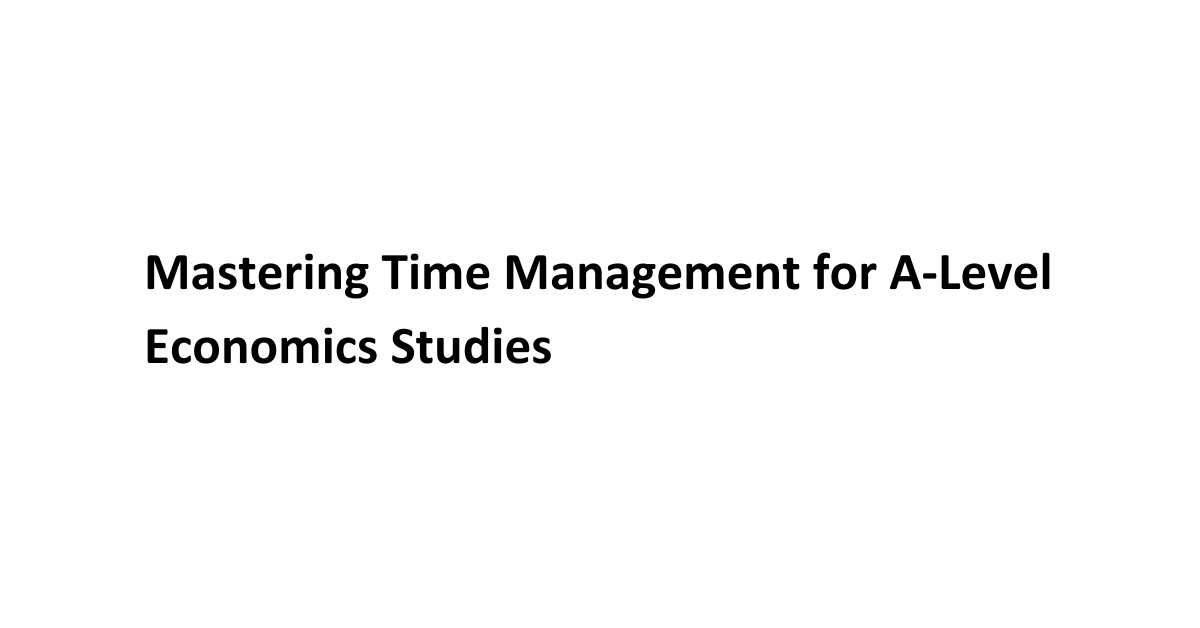
24 Oct Mastering Time Management for A-Level Economics Studies
As an A-Level Economics student, you face a demanding academic journey filled with complex concepts, rigorous coursework, and challenging exams. To excel in this subject, effective time management is a skill you cannot afford to overlook. Proper time management can help you study efficiently, prioritize tasks, and ultimately achieve academic success. In this article, we will explore valuable tips to help you master time management for your A-Level Economics studies.
1. Plan Your Schedule
The foundation of effective time management lies in creating a well-structured schedule. Start by making a comprehensive list of all your tasks, assignments, and deadlines. Whether you prefer using a physical planner, a digital calendar, or a simple to-do list, having a clear schedule is essential. Make sure to include all your commitments, such as class timings, tutorials, and extracurricular activities. A structured schedule will allow you to visualize your time and allocate it appropriately.
2. Prioritize Your Tasks
Once you have a clear schedule in place, the next step is to prioritize your tasks. Assess the importance and urgency of each assignment or activity. This assessment will help you focus on critical tasks while avoiding the trap of procrastination. Prioritization ensures that you allocate ample time to high-priority assignments, significantly enhancing your overall productivity.
3. Break Down Larger Tasks
Large and intimidating tasks, such as writing lengthy essays or tackling comprehensive research projects, can often feel overwhelming. To overcome this, consider breaking them down into smaller, more manageable tasks. This approach allows you to tackle one aspect at a time, steadily making progress towards completing the larger task. Breaking down tasks also helps alleviate stress and keeps you motivated throughout the process.
4. Utilize Time Blocks
Time blocks are a powerful tool in the realm of effective time management. Allocate specific time periods for particular tasks within your schedule. For instance, designate two hours for studying microeconomics and another two hours for macroeconomics. This approach ensures that you allocate adequate time to each task, preventing burnout and establishing a balanced study routine.
5. Minimize Distractions
Distractions can be the arch-nemesis of effective time management. The siren call of social media, constant email notifications, and smartphone distractions can derail your focus during study sessions. To combat this, consider utilizing apps or software that can block access to distracting websites or apps. By doing so, you can maintain your concentration and productivity during your dedicated study time.
6. Take Regular Breaks
While it might sound counterintuitive, taking regular breaks is an essential component of effective time management. Short breaks, such as going for a walk or engaging in a quick exercise routine, can refresh your mind, rejuvenate your energy, and enhance your ability to concentrate when you return to your tasks. A well-timed break can prevent burnout and help you maintain peak productivity.
7. Review and Adjust Your Schedule
Last but not least, remember that your schedule is not set in stone. It should be a flexible tool that adapts to your progress and evolving coursework demands. Regularly review and adjust your schedule based on your achievements and changing circumstances. This practice ensures that you stay on track, make necessary modifications, and optimize your time management strategies.
In conclusion, effective time management is an indispensable skill for A-Level Economics students. By implementing these strategies, such as planning your schedule, prioritizing tasks, breaking down assignments, using time blocks, minimizing distractions, taking regular breaks, and regularly reviewing and adjusting your schedule, you can manage your time effectively and excel in your Economics studies.
Mastering time management is the key to maximizing productivity, achieving academic excellence, and confidently navigating the challenges of A-Level Economics. With improved time management skills, you’ll be better equipped to tackle complex concepts, perform well in your exams, and ultimately succeed in your academic journey.



Sorry, the comment form is closed at this time.